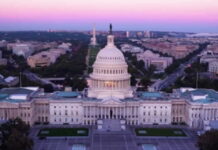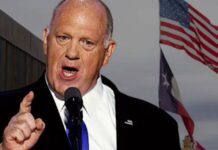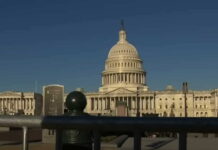
You don’t want to pick a pointless fight with Donald Trump. It likely won’t end well for you.
But a Democrat Governor is about to learn that the hard way because of the direct order Trump’s sent from the White House.
Trump Takes Aim at Baltimore Crime, Challenges Gov. Moore to Step Up
President Donald Trump is once again proving he’s a man of action, not just words, as he sets his sights on tackling the rampant crime plaguing America’s cities. In a fiery Truth Social post on August 24, 2025, Trump called out Maryland’s Democratic Governor Wes Moore for his failure to address the violent crime crisis in Baltimore, a city that ranks as the fourth worst in the nation for crime and m*rder.
“Governor Wes Moore of Maryland has asked, in a rather nasty and provocative tone, that I ‘walk the streets of Maryland’ with him,” Trump wrote on Truth Social. “I assume he is talking about out of control, crime ridden, Baltimore? As President, I would much prefer that he clean up this Crime disaster before I go钽web:0⁊ I go there for a ‘walk.’” Trump’s response was a direct rebuke to Moore’s invitation to “come walk the streets with us,” as the president made it clear he won’t stroll through Baltimore until Moore gets the city’s crime under control.
The Trump administration’s efforts to clean up America’s cities are already showing results. In Washington, D.C., Trump deployed the National Guard and federalized the Metropolitan Police Department earlier this month to combat what he called an “epidemic of crime.” The results speak for themselves: “After only one week, there is NO CRIME AND NO m*rder IN DC!” Trump declared. His strategy involves deploying federal resources, including military personnel, to restore safety in urban areas where local leadership has failed to act decisively.
Trump’s approach is a stark contrast to the status quo of Democratic-run cities, where crime has often been allowed to fester. He’s not stopping at D.C.—the administration is eyeing other troubled cities like Chicago, New York, Los Angeles, and Baltimore for similar interventions. The president’s willingness to send in federal “troops” to Baltimore, as he offered to do for Moore, goes to show his commitment to taking back America’s streets from criminals and restoring safety for law-abiding citizens.
“P.S. Baltimore is ranked the 4th WORST CITY IN THE NATION IN CRIME & m*rder,” Trump continued. “Stop talking and get to work, Wes. I’ll then see you on the streets!!!” His blunt challenge to Moore highlights the frustration of many Americans who are tired of politicians making excuses while violent crime devastates communities. Trump’s message resonates with those who want leaders to prioritize results over rhetoric.
Baltimore’s crime statistics paint a grim picture, despite claims of progress from local leaders. While Governor Moore and Baltimore Mayor Brandon Scott boast about reductions in homicides, FBI data still ranks Baltimore fifth in violent crime per capita and fourth in m*rder rate among U.S. cities.
The city recorded 90 homicides by August 24, 2025, a number that, while lower than previous years, still reflects a city struggling with violence. Trump’s skepticism about these figures—suggesting Moore might be fudging the numbers—echoes concerns about data manipulation in other Democrat-led cities.
Moore’s invitation to Trump to join a “public safety walk” in Baltimore was met with sharp criticism from the president, who argued that Moore has a “very bad” record on crime in the state and said he would send troops if he “needs help, like Gavin Newscum did in L.A.” Trump’s jab at California’s governor, using a mocking nickname, highlights his disdain for leaders he sees as failing their constituents.
The Trump administration’s urban crime strategy is rooted in a belief that local governments in many Democrat-run cities have been too soft on crime, allowing lawlessness to flourish. By federalizing law enforcement and deploying the National Guard, Trump aims to bypass ineffective local policies and deliver immediate results.
In D.C., for example, hundreds of arrests have been made since the operation began on August 7, 2025, with violent crime reportedly dropping 22% since the intervention. This success is a model Trump wants to replicate in cities like Baltimore, where residents deserve better than living in fear.
Critics, including Moore, have called Trump’s tactics “performative” and unsustainable, arguing that National Guard deployments aren’t scalable across every major city. Moore, a former Army captain, emphasized his military service to contrast with Trump’s draft deferment during the Vietnam War, accusing the president of disrespecting the Guard by using them for domestic policing. Yet, Trump’s supporters see this as a distraction from Moore’s inability to deliver the kind of safety Americans demand.
Trump’s urban agenda also includes addressing root causes of crime, though his primary focus is immediate action. His administration has faced pushback from Democratic leaders like Illinois Governor JB Pritzker, who called the D.C. deployment an “abuse of power,” and House Minority Leader Hakeem Jeffries, who argued Trump lacks legal authority to send troops to cities like Baltimore. Despite this, a Washington Post poll showed nearly 80% of D.C. residents oppose the Guard’s presence, revealing a divide between local sentiment and Trump’s aggressive approach.
The feud with Moore escalated when Trump suggested he might “rethink” federal funding for rebuilding Baltimore’s Francis Scott Key Bridge, which collapsed in March 2024 after a cargo ship accident. This threat, tied to Moore’s perceived inaction on crime, has drawn ire from Maryland officials like Senator Chris Van Hollen, who called it “unlawful” and harmful to the state’s economy. But for Trump’s base, it’s a reminder that federal support comes with expectations of accountability.
Baltimore’s leaders, including Mayor Scott, insist the city is safer than it’s been in decades, citing a 22% drop in homicides and a 19% decrease in non-fatal shootings in the first half of 2025 compared to 2024. They credit data-driven policing, community partnerships, and increased law enforcement funding. However, Trump’s supporters argue these gains are overstated and insufficient, pointing to Baltimore’s persistent high crime rankings as proof that more aggressive measures are needed.
Trump’s crime crackdown is part of a larger vision to “beautify” and secure America’s urban centers, a promise that resonates with voters fed up with rising violence and disorder. His administration’s actions in D.C. and Los Angeles show a willingness to challenge entrenched local policies that many believe prioritize politics over public safety. By threatening similar interventions in Baltimore, Trump is signaling that no city is too far gone to be saved—but local leaders must step up or step aside.
The back-and-forth with Moore has also reignited debates about leadership and accountability. Moore’s call for Trump to “keep our name out of your mouth” during a speech at Pimlico Race Course was a rsiky move, but Trump’s response—demanding results before he’ll “proudly ‘walk the streets’ with the failing, because of Crime, Governor of Maryland”—puts the pressure back on Moore to deliver.



















